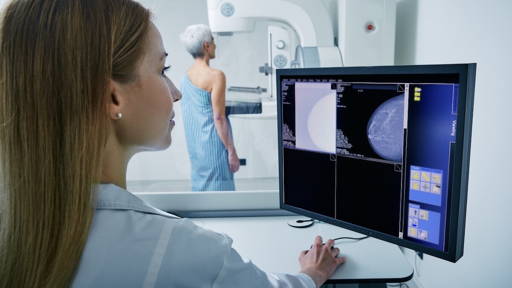With a quick “eye test,” doctors can determine whether a patient looks older or younger than their age. That biological age can influence important medical decisions. This intuitive assessment may soon get an AI upgrade. Using FaceAge, a deep learning algorithm, biological age can be determined more accurately. The AI tool has been trained on tens of thousands of photographs and it showed that cancer patients are biologically on average five years older than healthy peers.
The authors of the study, recently published in The Lancet Digital Health, say it could help doctors decide whether a patient is capable of undergoing a severe treatment or a milder treatment option. “We hypothesize that FaceAge can be used as a biomarker in cancer care to quantify a patient's biological age and help a physician make these difficult decisions,” said Raymond Mak, an oncologist at Mass Brigham Health (MBH).
Biological age influences treatment choice
Take two hypothetical patients: a spry 75-year-old whose biological age is 65 and a frail 60-year-old whose biological age is 70. Aggressive radiation therapy might be appropriate for the former but risky for the latter. The same logic could help decisions about heart surgery, hip replacements or end-of-life care.
There is growing evidence that people age at different rates, shaped by genes, stress, exercise and habits such as smoking or drinking. While expensive genetic tests can show how DNA wears down over time, FaceAge promises insight using only a selfie.
Training AI tool
The model was trained on 58,851 portraits of presumably healthy adults over 60, taken from public datasets. It was then tested on 6,196 cancer patients treated in the United States and the Netherlands, using photos taken just before radiation treatment. Patients with malignancies looked, on average, 4.79 years biologically older than their chronological age. In cancer patients, a higher FaceAge score predicted a substantially worse chance of survival even after taking into account actual age, sex and tumor type, and the risk increased sharply for anyone whose biological age passed 85.
FaceAge seems to weigh the signs of aging differently than people do. Gray hair or baldness, for example, matter less than subtle changes in facial muscle mimicry. In addition, the AI tool also made doctors more accurate. Eight doctors were asked to look at photos of terminal cancer patients and guess who would die within six months. With the help of FaceAge's data, prediction went a lot better.
Bias and ethics
The researchers also concluded that controls revealed no significant racial bias in FaceAge's predictions, a known drawback of AI tools when applied to non-white individuals. The researchers are currently working on training a second-generation model on 20,000 patients. They are also investigating how factors such as makeup, cosmetic surgery or light variations in the room can fool the system.
An AI tool that can read biological age from a selfie could be a boon for doctors, but also enticing for life insurance companies or employers looking to assess risk. “It's definitely something that needs attention, to make sure these technologies are only used for the benefit of the patient,” said Hugo Aerts, co-leader of the study and director of MGB's AI-in-medicine program.
There is another dilemma to consider. Being told that your body is biologically older than you thought could trigger healthy changes or cause anxiety. The researchers plan to open a public FaceAge portal where people can upload their own photos to sign up for a study to further validate the algorithm. That validation is obviously necessary before this AI tool could begin to be used in practice.
Selfies and AI
The use of AI tools to determine a person's health status was also explored in the UK late last year. There, researchers from King's College London tested AI algorithms that predict metabolic age based on blood values. In 225,000 UK Biobank participants between the ages of 40 and 69, they looked at the relationship between this predicted age and health. Accelerated metabolic aging correlated with poorer health, more chronic diseases and shorter telomeres. Although there was no strong link between delayed aging and better health, the researchers suggest that AI may help with early detection of health risks and promotion of healthy lifestyles.
At the 2023 CES, Nuralogix's Anura app was showcased. An AI app that could measure various body functions such as blood pressure, heart rate, stress level, BMI, skin age and even risk of conditions such as hypertension and stroke with a 30-second selfie video. That app analyzed subtle blood flow changes in the face, made possible by translucent skin that reflects light. User data from about 35,000 people were used to train the AI algorithm.









